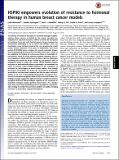HSP90 empowers evolution of resistance to hormonal therapy in human breast cancer models
Author(s)
Whitesell, Luke; Santagata, Sandro; Mendillo, Marc L.; Lin, Nancy U.; Proia, David A.; Lindquist, Susan; ... Show more Show less
DownloadWhitesell-2014-HSP90 empowers evolu.pdf (1.341Mb)
PUBLISHER_POLICY
Publisher Policy
Article is made available in accordance with the publisher's policy and may be subject to US copyright law. Please refer to the publisher's site for terms of use.
Terms of use
Metadata
Show full item recordAbstract
The efficacy of hormonal therapies for advanced estrogen receptor-positive breast cancers is limited by the nearly inevitable development of acquired resistance. Efforts to block the emergence of resistance have met with limited success, largely because the mechanisms underlying it are so varied and complex. Here, we investigate a new strategy aimed at the very processes by which cancers evolve resistance. From yeast to vertebrates, heat shock protein 90 (HSP90) plays a unique role among molecular chaperones by promoting the evolution of heritable new traits. It does so by regulating the folding of a diverse portfolio of metastable client proteins, many of which mediate adaptive responses that allow organisms to adapt and thrive in the face of diverse challenges, including those posed by drugs. Guided by our previous work in pathogenic fungi, in which very modest HSP90 inhibition impairs resistance to mechanistically diverse antifungals, we examined the effect of similarly modest HSP90 inhibition on the emergence of resistance to antiestrogens in breast cancer models. Even though this degree of inhibition fell below the threshold for proteotoxic activation of the heat-shock response and had no overt anticancer activity on its own, it dramatically impaired the emergence of resistance to hormone antagonists both in cell culture and in mice. Our findings strongly support the clinical testing of combined hormone antagonist-low-level HSP90 inhibitor regimens in the treatment of metastatic estrogen receptor-positive breast cancer. At a broader level, they also provide promising proof of principle for a generalizable strategy to combat the pervasive problem of rapidly emerging resistance to molecularly targeted therapeutics.
Date issued
2014-12Department
Massachusetts Institute of Technology. Department of Biology; Whitehead Institute for Biomedical ResearchJournal
Proceedings of the National Academy of Sciences
Publisher
National Academy of Sciences (U.S.)
Citation
Whitesell, Luke, Sandro Santagata, Marc L. Mendillo, Nancy U. Lin, David A. Proia, and Susan Lindquist. “HSP90 Empowers Evolution of Resistance to Hormonal Therapy in Human Breast Cancer Models.” Proceedings of the National Academy of Sciences 111, no. 51 (December 8, 2014): 18297–18302.
Version: Final published version
ISSN
0027-8424
1091-6490